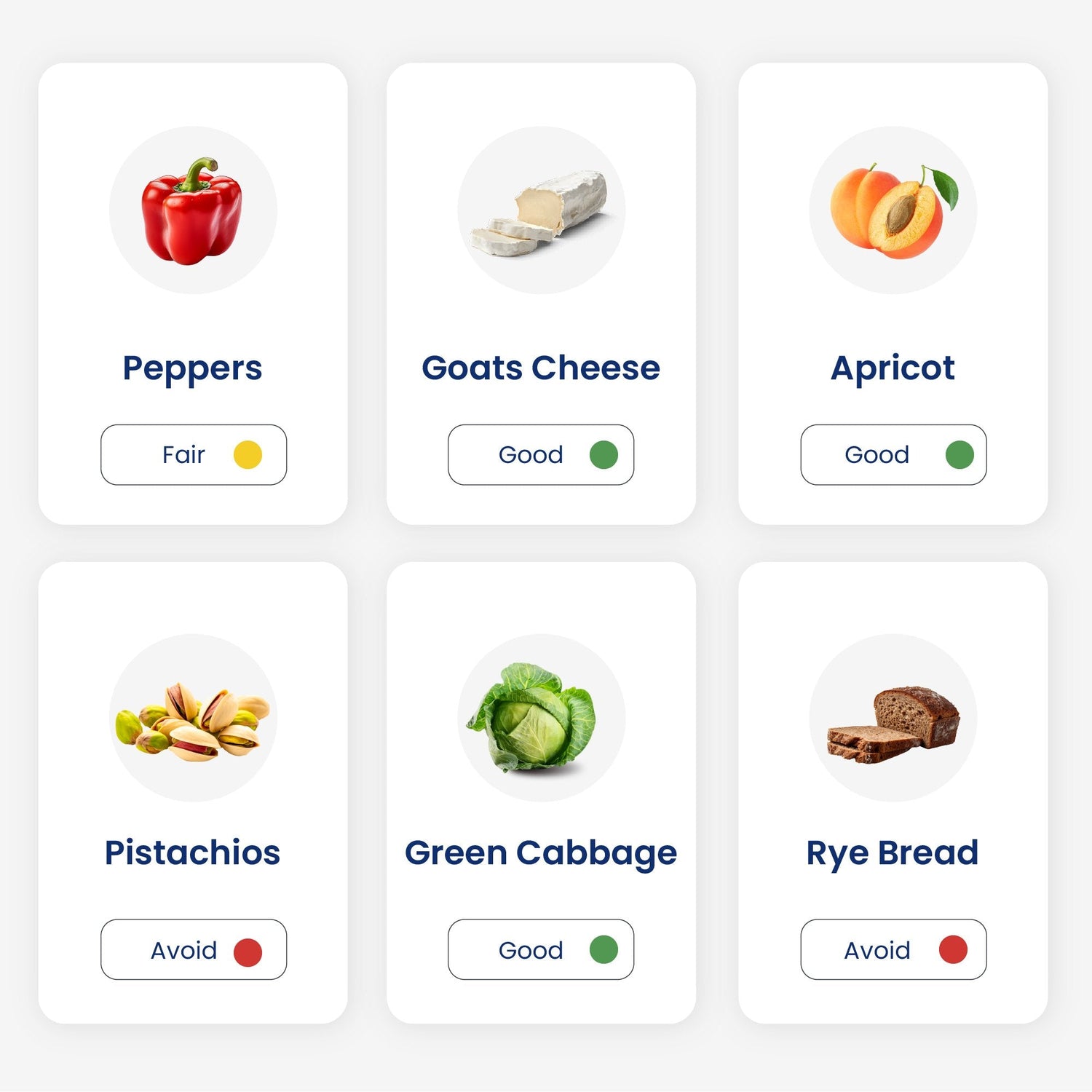
Medically reviewed by Kate Hilton RD
On 29 April 2024
What are the best foods for gut health?
| Type of food | Examples | Why they help |
|---|---|---|
| Fermented foods | Yogurt, kefir, sauerkraut, kimchi, miso, tempeh, kombucha | These foods are rich in probiotics, including some of the most well-known beneficial bacteria like Lactobacillus and Bifidobacterium, which enhance the health and diversity of the gut microbiome. Consuming these can help boost immunity, reduce inflammation, improve digestion, and even help manage and prevent chronic diseases. Probiotics deliver beneficial bacteria directly to the gut. |
| High-fibre foods | Legumes (lentils, chickpeas), beans (black beans, kidney beans), peas, oats, avocados, bananas, apples, pears | Our body is unable to digest fibre, the bacteria within our gut help our body to digest it through a process called fermentation. This fermentation process produces short-chain fatty acids (SCFAs) which nourish the beneficial bacteria and help to maintain gut diversity, reduce inflammation, and enhance nutrient absorption. These foods also aid in regular bowel movements and can help manage weight. |
| Prebiotic foods | Garlic, onions, leeks, asparagus, Jerusalem artichokes, barley, apples, flaxseeds, wheat bran | Prebiotics are a type of dietary fibre found in certain foods that feed and nourish the beneficial bacteria in your gut. They encourage the growth of beneficial bacteria and enable them to increase in numbers, which can improve gastrointestinal health, enhance nutrient absorption, and help regulate immune function. This can lead to improved digestion and a lower risk of chronic illness. |
| Polyphenol-rich foods | Berries (blueberries, blackcurrants, blackberries), green tea, dark chocolate, almonds, olives, coffee | Polyphenols are plant micronutrients that are metabolised by gut bacteria, thus promoting the growth of beneficial bacteria, and inhibiting the growth of harmful bacteria. The antioxidant properties of these foods also protect the body against oxidative stress and inflammation, contributing to cardiovascular health, reducing your risk of diabetes and obesity. |
| Whole grains | Barley, whole wheat, quinoa, brown rice, millet | Whole grains contain a mix of soluble and insoluble fibres, which help to encourage a healthy gut microbiome. They contribute to overall recommended daily fibre intake, aiding in digestion and regular bowel movements, and help prevent the growth of pathogenic bacteria in the gut. Regular consumption can also lower cholesterol levels and help maintain steady blood sugar levels. |
| Nuts and seeds | Almonds, flaxseeds, chia seeds, walnuts, pumpkin seeds | Nuts and seeds are a useful source of fibre, healthy fats, and proteins, all of which can provide benefits to the diversity of gut bacteria. They help to create a more diverse and balanced microbiome. The omega-3 fatty acids in flaxseeds and chia seeds can help to reduce inflammation in the gut, which is beneficial for overall digestive function. |
| Lean proteins | Fish (e.g., salmon, mackerel), chicken, turkey, plant-based proteins (e.g., lentils, chickpeas, tofu) | Protein-rich foods are essential for gut health, especially those that are low in saturated fats. Fish such as salmon and mackerel are high in omega-3 fatty acids, which help reduce intestinal inflammation. Plant-based proteins provide both protein and fibre, supporting the growth of beneficial gut bacteria and contributing to a healthier gut ecosystem. |
| Water | 3.7 litres for men, 2.7 litres for women | Water is crucial for every organ and function in our body. Insufficient hydration can lead to constipation by causing harder, drier stools that are difficult to pass. |
How can I make my gut healthy?
Maintaining a healthy gut involves implementing a number of changes to your diet and lifestyle. Improving your gut health cannot be attributed to just one thing, instead it involves a joint approach of:
- Dietary and lifestyle changes – implementing gut friendly food such as the foods contained in the list above.
- Probiotics and prebiotics - Both probiotics and prebiotics help to increase the number of beneficial bacteria within the gut and can significantly improve our overall health. Learn more about the difference between prebiotics and probiotics in our comparison guide.
- Regular exercise: Physical exercise helps us to maintain a healthy bodyweight, encourages regular bowel movements and is hugely beneficial in reducing our stress levels and boosting our moods. All of which benefits our gut health.
- Adequate sleep: Aim for 7-9 hours per day.
- Manage your stress levels: Managing your stress levels will reduce the body's natural production of cortisol, a stress hormone which can directly impact the gut.
- Stay hydrated
- Limit alcohol intake
Our guide on how to improve gut health includes more information on why gut health is important and what steps you can take to improve it.
To rebalance your gut microbiome we use a method that starves harmful bacteria and feeds beneficial bacteria, helping us to rebalance and improve the diversity of your gut microbiome. If you want to know the exact foods your gut needs to improve, test your gut microbiome for a personalised food and supplement plan.
What is the best food for gut health?
It’s difficult to crown one type of food as the “best”, however fermented foods such as sauerkraut, kimchi, kefir have gained a lot of praise and attention from gut health experts because of the live strains of probiotics they contain. These probiotic strains are hugely beneficial for your gut and encourage the growth of beneficial bacteria.
However, they should be adopted as part of a balanced diet along with the other foods we have listed above.



